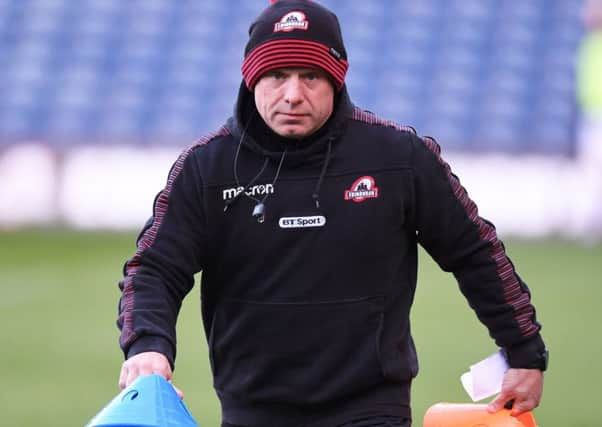Edinburgh coach Richard Cockerill lets results do the talking


As much as with football, the judges assessing rugby’s top bosses must weigh up whether to reward straight and simple success or apply a bit of lateral thinking and plump for the man they feel has done the best job with the tools at his disposal, exceeded expectations and overseen the biggest upturn in a team’s fortunes.
The latter criteria would surely have Edinburgh’s Richard Cockerill in a strong position to be named Guinness Pro14 Coach of the Year for this season. The award for that competition usually take place ahead of the final which gives another reason to avoid the lazy choice of simply handing the accolade to the coach whose team has hoisted the trophy.
Advertisement
Hide AdAdvertisement
Hide AdFor the first time ever, an assessment of Edinburgh’s campaign, which of late has more often been a post-mortem, remains a work in progress as the capital pro team embark into uncharted territory beyond the end of the regular season.
They will play their first-ever match in the tournament’s knockout phase, which was introduced in 2011, when they make the daunting trip to face Munster at their Thomond Park fortress in Limerick on Saturday.
It is one of a series of notable achievements Cockerill has ticked off after arriving in the Scottish capital last summer, including a record number of wins in the league competition, 15, and an impressive “Grand Slam” of wins over the Irish provinces. The cherry on the pie, of course, is securing a return to the elite European Champions Cup after four seasons in the second-tier Challenge Cup.
Edinburgh reached the final of that competition three years ago but, in relative terms, this Saturday’s match is surely the biggest for the club since their surprise run to the then Heineken Cup semi-finals in 2012.
Cockerill has also returned the 1872 Cup to the capital after Saturday’s rousing 24-19 defeat of Glasgow in front of a record crowd for the inter-city fixture at BT Murrayfield.
Not that the former England hooker and Leicester and Toulon coach views that with much significance, dismissing parochial focus on the derby games as “small mindedness”. Although, that hasn’t stopped him departing from the cosy “AsOne” SRU hymnsheet and firing a few grenades westward, calling time on the Warriors time as Scottish rugby’s “favoured sons” and expressing a desire to “poke the Glasgow bear”.
It is this kind of forthrightness which has been the defining theme of Cockerill’s first season at the helm of a ship which was listing, if not in the process of sinking. The high-profile appointment was an impressive one and widely welcomed when it was announced towards the end of another bleak season over a year ago.
There was, however, some nervousness about how it would all pan out. Cockerill came with a confrontational reputation, with rumours of a “player revolt” ahead of his sacking from the Leicester job midway through last season.
Advertisement
Hide AdAdvertisement
Hide AdThere were question marks over how the Englishman would adapt to managing a team which is run by a national union and how Edinburgh’s players, who had developed a reputation of being a bit soft and pampered, would react to a new broom that came with spikes rather than bristles.
Cockerill has, in the past, made no secret of his disdain for elements of the media, devoting a vitriolic section of his tellingly titled autobiography In Your Face: A Rugby Odyssey to it.
That suspicion no doubt remains but every Cockerill press conference since he arrived in the capital has begun with a handshake for everyone in attendance, some entertaining banter and, more importantly, the kind of quotes that have smoke coming off laptops and sports editors salivating.
What the press write is no doubt well down Cockerill’s list of cares but Edinburgh have, for some time, been a club not lacking in need for some decent coverage and exposure to a largely apathetic city and beyond.
It has been Cockerill’s results which have done the talking though, and earned him an extension to his initial two-year contract.
Off-field problems such as the stripping of the captaincy from youngster Magnus Bradbury, John Hardie’s ban for gross misconduct and the collapse of the experiment of moving league games to Myreside instead of cavernous BT Murayfield, have all been taken in Cockerill’s purposeful stride.
The coach has instilled standards and self-belief in a squad which seemed to have lost their way and, despite being the epitome of proud Englishman, has embraced the chance to develop a true Scottish core to his team.
Cockerill’s predecessor Alan Solomons was a decent man, steeped in rugby knowledge but his professorial approach, and reflex to place faith in second-rate southern hemisphere imports, had left Edinburgh going nowhere.
Advertisement
Hide AdAdvertisement
Hide AdCloser to the players in age and with 27 England caps to his name, Cockerill has elicited a response throughout the squad.
Perhaps the shining example is Stuart McInally, pictured above, in the coach’s former hooker position, who has been roused from the doldrums of injury and poor form to deliver a season of sustained excellence for both club and country.
Cockerill has made no bones about the fact that the job has only been started.
For all the advances they have made, Edinburgh will travel to Munster this weekend as massive underdogs and the issue of forging an identity and home that can rival Glasgow remains.
Finally, though, a look into Edinburgh’s future comes with anticipation rather than dread.